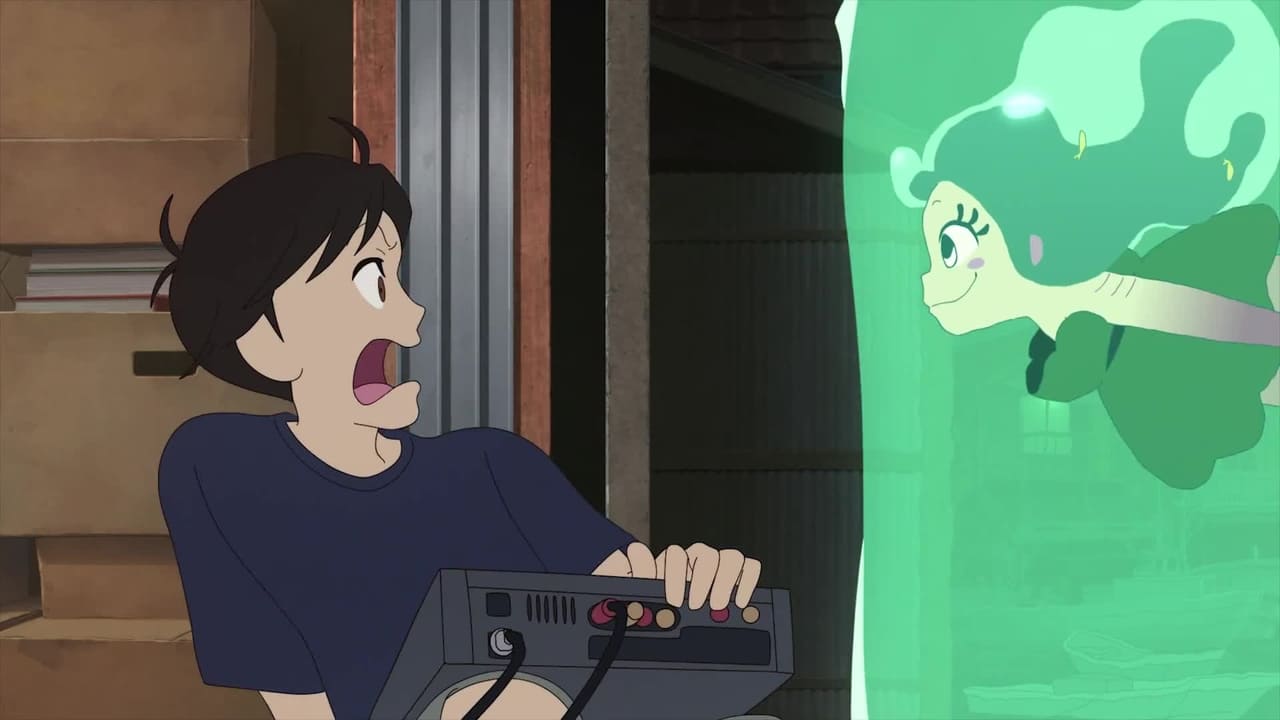
 Lu Over the Wall
— Your "love" changes me.
Lu Over the Wall
— Your "love" changes me.

 Lu Over the Wall
— Your "love" changes me.
Lu Over the Wall
— Your "love" changes me.
Heavy spoilers ahead, I'd just like to talk about the movie. Oh yeah, seeing it again in it's original Japanese version helped quite a bit. I caught a lot more stuff this time, including stylistic choices I didn't pick up on previously. All comparisons to Ponyo are only valid on surface level. The movie's tone and messages are unique to it's own. I really appreciated the flashbacks done in a tasteful way, like they're child drawings from the perspective different to each character. The story is excellently told, able to tell the history of the town, and tell the stories of a number of people, some barely getting screen time, but their resolutions being surprisingly emotional. A couple beats I missed: Kai is developing the final song throughout the entire movie, and only sings it at the end, after gaining his confidence from Lu (Somehow I didn't pick up on that from the English dub). One inspiration I just picked up driving home, was Lu could be interpreted as the Mary Poppins archetype. She comes to this broken town, covered in shadows from a curse, wants everyone to become friends, and by the end, once all is fixed, she moves on. Some may not like the romantic involvement between her and the boy, but... love is strange like that. Kai first sees her as reminder of his mother, which inspires him to express himself again, then grows a child like genuine fondness to her. It's actually quite remarkable this pulled off giving backstories a large selection of the cast, and teaching some heavy life realities in the process. Your initial dreams may not work out like you planned, but other opportunities you didn't expect will come. My heart grows heavy just thinking about it. The style is expressionist and lively, almost copying decades old animation, a welcome return. And the four child leads are just so endearing. The scene of Lu and Kai walking around town to the guitar cover of Naoko's theme is especially magical; not in a spectacle way, but something about the playful dichotomy of these two really moves you. The imagery and dialogue makes for a heavy sequence. If there was ever a one-shot anime movie I would love to see a sequel for, it's this. One of my new favorite movies of all time. I'll edit this review if I think up anything else to say.
Lu Over The Wall is not a narrative masterpiece. It's not concisely plotted, its characters are not the most memorable, and its themes are a little muddled. There's an antagonist fake-out that doesn't work, and the bond between the human trio isn't quite as earned and heartwarming as the film wants it to be. But none of this is the point.
Visually and sonically, Lu is a feast for the senses. The titular Lu and her father are adorable and endearingly designed, and it's impossible to watch them and not be left grinning. The various animation styles are striking and impossible to look away from, and the soundtrack is masterfully unpolished and earnest. The combination of the animation and music conveys feelings far better than the writing does. For a movie to _watch_, Lu more than fits the job. Expect anything more, and you may be left burned.
I challenge you to watch this movie and then watch the movie Song of the Sea
Heavy spoilers ahead, I'd just like to talk about the movie. Oh yeah, seeing it again in it's original Japanese version helped quite a bit. I caught a lot more stuff this time, including stylistic choices I didn't pick up on previously. All comparisons to Ponyo are only valid on surface level. The movie's tone and messages are unique to it's own. I really appreciated the flashbacks done in a tasteful way, like they're child drawings from the perspective different to each character. The story is excellently told, able to tell the history of the town, and tell the stories of a number of people, some barely getting screen time, but their resolutions being surprisingly emotional. A couple beats I missed: Kai is developing the final song throughout the entire movie, and only sings it at the end, after gaining his confidence from Lu (Somehow I didn't pick up on that from the English dub). One inspiration I just picked up driving home, was Lu could be interpreted as the Mary Poppins archetype. She comes to this broken town, covered in shadows from a curse, wants everyone to become friends, and by the end, once all is fixed, she moves on. Some may not like the romantic involvement between her and the boy, but... love is strange like that. Kai first sees her as reminder of his mother, which inspires him to express himself again, then grows a child like genuine fondness to her. It's actually quite remarkable this pulled off giving backstories a large selection of the cast, and teaching some heavy life realities in the process. Your initial dreams may not work out like you planned, but other opportunities you didn't expect will come. My heart grows heavy just thinking about it. The style is expressionist and lively, almost copying decades old animation, a welcome return. And the four child leads are just so endearing. The scene of Lu and Kai walking around town to the guitar cover of Naoko's theme is especially magical; not in a spectacle way, but something about the playful dichotomy of these two really moves you. The imagery and dialogue makes for a heavy sequence. If there was ever a one-shot anime movie I would love to see a sequel for, it's this. One of my new favorite movies of all time. I'll edit this review if I think up anything else to say.